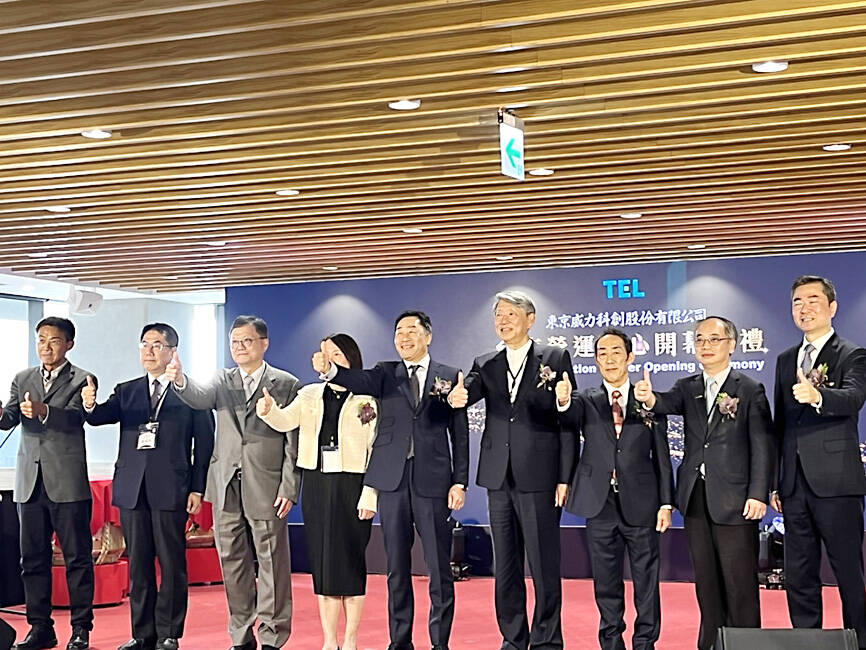Tokyo Electron Ltd, Asia’s biggest semiconductor equipment supplier, yesterday launched a NT$2 billion (US$61.5 million) operations center in Tainan as it aims to expand capacity and meet growing demand.
Its new Taiwan Operations Center is expected to help customers release their products faster, boost production efficiency and shorten equipment repair time in a cost-effective way, the company said.
The center is about a five-minute drive from the factories of its major customers such as Taiwan Semiconductor Manufacturing Co’s (TSMC, 台積電) advanced 3-nanometer and 2-nanometer fabs.

Photo: Grace Hung, Taipei Times
The operations center would have about 1,000 employees when it is fully utilized, the company said.
TSMC vice president T.S. Chang (張宗生), who oversees advanced technology and mask engineering, attended the center’s opening ceremony, along with United Microelectronics Co (聯電) and Winbond Electronics Corp (華邦電) representatives.
“With the opening of this operations center, we aim to reach two goals: First, we aim to expand our scale to cope with the ongoing growth of the Taiwanese market. Second, we hope to shorten the product repairing time cycle and to broaden the supply chain,” Tokyo Electron Taiwan Ltd chairman Hikaru Ito said at the ceremony.
The six-floor facility is comprised of a repair center and a testing lab to provide customers with one-stop services, as Taiwan plays a key role in the global artificial intelligence (AI) industry, Tokyo Electron Taiwan president Roger Chang (張天豪) said.
For the first time, the company can help fix vacuum transpiration robotic arms used in semiconductor equipment for customers in Taiwan, it said.
In the past, it took about seven months to complete the whole repair process in Japan, compared with one to two months now, it said.
The new repair center would also help customers fix damaged ovens used in lithography equipment, it said.
The company is mulling to build a more resilient supply chain in Taiwan through sourcing key parts locally, it said, adding that it has a shortlist of potential suppliers.
Taiwan has become the fourth-biggest market for the company, accounting for 13.3 percent of its total revenue in the second quarter, a spike from 9.3 percent a year earlier, a company financial statement showed.
The new operations center demonstrates the close partnership between Taiwan and Japan in the semiconductor field, Minister of Economic Affairs J.W. Kuo (郭智輝) said at the opening ceremony.

To many, Tatu City on the outskirts of Nairobi looks like a success. The first city entirely built by a private company to be operational in east Africa, with about 25,000 people living and working there, it accounts for about two-thirds of all foreign investment in Kenya. Its low-tax status has attracted more than 100 businesses including Heineken, coffee brand Dormans, and the biggest call-center and cold-chain transport firms in the region. However, to some local politicians, Tatu City has looked more like a target for extortion. A parade of governors have demanded land worth millions of dollars in exchange

An Indonesian animated movie is smashing regional box office records and could be set for wider success as it prepares to open beyond the Southeast Asian archipelago’s silver screens. Jumbo — a film based on the adventures of main character, Don, a large orphaned Indonesian boy facing bullying at school — last month became the highest-grossing Southeast Asian animated film, raking in more than US$8 million. Released at the end of March to coincide with the Eid holidays after the Islamic fasting month of Ramadan, the movie has hit 8 million ticket sales, the third-highest in Indonesian cinema history, Film

Taiwan Semiconductor Manufacturing Co’s (TSMC, 台積電) revenue jumped 48 percent last month, underscoring how electronics firms scrambled to acquire essential components before global tariffs took effect. The main chipmaker for Apple Inc and Nvidia Corp reported monthly sales of NT$349.6 billion (US$11.6 billion). That compares with the average analysts’ estimate for a 38 percent rise in second-quarter revenue. US President Donald Trump’s trade war is prompting economists to retool GDP forecasts worldwide, casting doubt over the outlook for everything from iPhone demand to computing and datacenter construction. However, TSMC — a barometer for global tech spending given its central role in the

Alchip Technologies Ltd (世芯), an application-specific integrated circuit (ASIC) designer specializing in server chips, expects revenue to decline this year due to sagging demand for 5-nanometer artificial intelligence (AI) chips from a North America-based major customer, a company executive said yesterday. That would be the first contraction in revenue for Alchip as it has been enjoying strong revenue growth over the past few years, benefiting from cloud-service providers’ moves to reduce dependence on Nvidia Corp’s expensive AI chips by building their own AI accelerator by outsourcing chip design. The 5-nanometer chip was supposed to be a new growth engine as the lifecycle